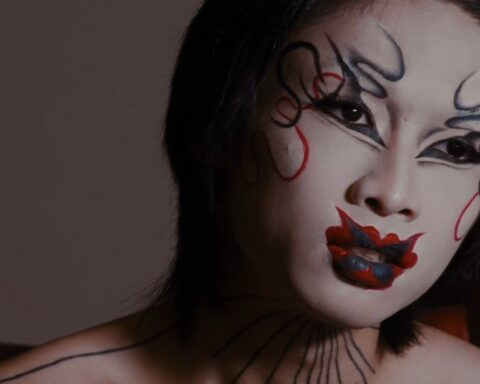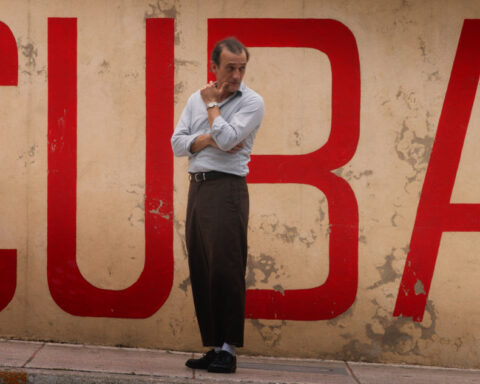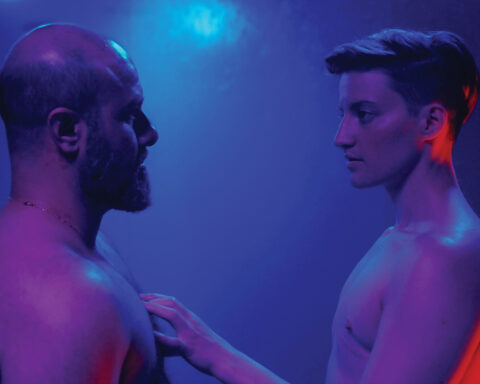Manifesto
(Australia/Germany, 95 min.)
Dir. Julian Rosefeldt
Starring: Cate Blanchett
“Nothing is original,” says a teacher, played by the extraordinary Cate Blanchett (Carol, Blue Jasmine), to a class of wide-eyed youngsters. The teacher delivers a lecture on the principles of Dogma 95, the Danish anti-cinematic movement pioneered by directors like Lars Von Trier and Thomas Vinterberg. The students listen as the teacher outlines the provocative world cinema manifesto and corrects her pupils on the basic tenants of achieving true art by eschewing false scenery, unnecessary action, non-diegetic music, and egotistical director credits. Excerpts of various cinematic doctrines are shared with the kids as Blanchett relishes the art of performance by playfully delivering the lecture in a friendly singsong monologue. She makes the mandate of some of contemporary film’s most controversial auteurs accessible for first graders. Manifesto pays tribute to artists who dissolve boundaries and defy convention.
Julian Rosefeldt’s ingenious documentary adapts a 2015 art installation in which he and Blanchett brought different movements of the art world to life in a multi-screen performance. Blanchett plunges deep into a baker’s dozen of characters to embody artistic manifestos from around the world in 12 threads spliced across a one-of-a-kind hybrid film. The script parses lines from these artistic proclamations in a kind of archival verbatim theatre in which old words, as written by the artists of the past, combine into a conflated modern document on artistic practice. The characters extol the death of originality and caution the limitations of truth and sincerity as the film navigates genres and styles. The cutting of the film splinters the characters into a kaleidoscope of Cates as the words of the manifestos play off one another with eclectic energy. Manifesto streamlines the fractured 130 minutes of the installation into a quick and invigorating 95 minutes of inspired art.
The teacher might be right in saying that originality doesn’t exist, but as Blanchett morphs into different guises like a Russian choreographer preaching Fluxus while perfecting her troupe’s moves, a punk rocker wrestling with sweaty stream of consciousness musings on creationism, and a speaker delivering a diatribe on Dadaism in the form of an eulogy, Manifesto proves itself to be one of the most original films of this or any year. Blanchett also embodies a dowdy housewife who pays tribute to Pop Art while her family sits at table saying grace, a puppeteer who toys with notions of surrealism, a homeless man who natters on about matters of situationism, a broker who dabbles in futurism to play the stock market, a waste disposal employee who ponders architecture, and a well-coiffed CEO who gives a speech about abstract expressionism with razor-sharp precision. Each performance is just as delicious as the other as Blanchett serves an all-you-can-eat buffet of great acting.
In the real coup of the film, Blanchett assumes a dual role as two Cates on the evening news. One is an anchor in the studio and the other is a reporter in the field. Cate and Cate deliver an electric piece of reportage on the foundations of conceptual art that passes as a rat-a-tat-tat exchange, which fuses the art of screen performance with visionary notions of expanding the ways in which we conceive art. As the two distinct Blanchetts command the screen, Manifesto comes to fruition in its theoretical innovation.
Cate Blanchett excels as she adopts this challenging range of characters in an equally varied spectrum of accents, speech patterns, and physical comportments. Her performance evokes comparison to Meryl Streep’s shape-shifting turn as an angel, a rabbi, a frumpy Mormon matriarch, and notorious spy Ethel Rosenberg in Mike Nichols’ Angels in America, as she uses the extensive range of technical elements of her characters, like wigs, make-up and costumes, to create unique personas that share a tangible through-line across the film. Manifesto is a masterful showpiece on the power of the screen performance as Blanchett illustrates the subtle nuances that define the classes, cultures, ages, politics, and worldviews that create distinct characters—as well as the social forces that contribute to the evolution of artistic movements. Blanchett’s ability to convey shifts in consciousness is remarkable as each character blazes with inspiration.
The film is also a proclamation of the power of screen performances and art more broadly: the act of creation is a fully immersive experience that demands artists to commit themselves body and soul in search of greatness. Manifesto is an innovative treatise on artistic inspiration in which Cate the Chameleon finds truth through performance.
Manifesto opens:
-June 16 in Vancouver at Vancity Theatre and in Calgary at Globe Cinema
-June 30 in Toronto at Hot Docs Ted Rogers Cinema
-July 7 in Montreal at Cinema du Parc











